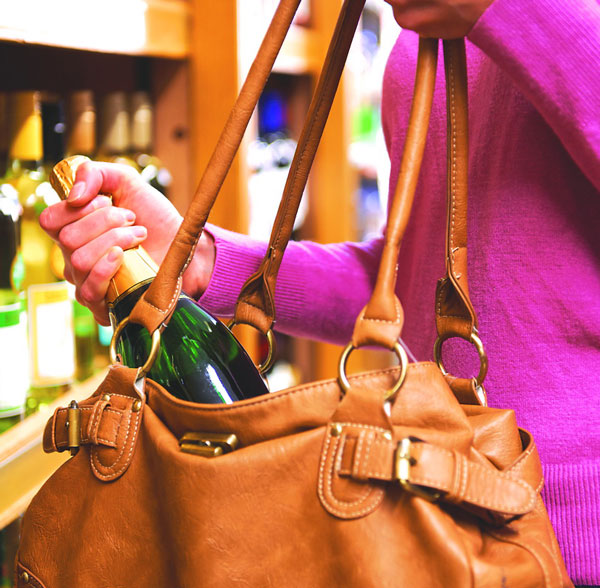As I was checking out of the neighborhood Rite Aid the other day, I noticed a young man fill a small cart mostly with liquor bottles and walk past the waiting line and out the door. A man in line loudly pointed this out to the clerk. She shrugged and said, “Yep, it happens all day long, every day. They know they can steal without any penalty. They fire us if we try to do anything about it.”
A reader had just written me about witnessing the same situation at the same J Street store while eating ice cream cones with his kids. He said his children were aghast. He noted three nearby Rite Aid stores face closure. The locations on Folsom Boulevard and in Midtown have already closed. The Alhambra location was in process of shutting down. And the J Street location just had an armed robbery.

My son, who lives in San Francisco near his law school in the Tenderloin, says the local drug store has everything under lock and key in plastic cases. A clerk walks around and unlocks items customers wish to buy. In San Francisco, retail theft drove five Walgreens out of business last October. A total of 23 drug stores have closed in the city.
Big-city pharmacies display merchandise in locked plastic cases. Dishwasher pods, shaving cream, even shampoo bottles are locked up to reduce losses from a shoplifting epidemic.
My friend Sheree Johnston, who used to own East Sac Hardware, said after the arrival of Prop. 47 thieves would fill carts with merchandise and determine the value using a calculator, making sure it was under $950 in case they were caught. She had a convenient back door to the parking lot but closed it when thieves walked out with stolen merchandise all day long.
Two recent national reports show the scope of theft. Business.org found a 54-percent increase in shoplifting last year among 700 small businesses. Twenty-three percent said it happens daily. The National Retail Federation surveyed 61 medium to large retailers and found organized retail crime cost an average of more than $700,000 per $1 billion in sales in 2020.
A spokesman for CVS says, “Our stores have experienced a 300-percent increase in retail theft incidents since the pandemic began in 2020.”
In California, this trend began with the passage of Prop. 47 in 2014. Looking back, it’s hard to believe election officials allowed this proposition to be called “The Safe Neighborhoods and Schools Act.” Talk about misleading voters!
Prop. 47 implemented three broad changes to felony sentencing laws. First, it reclassified certain theft and drug possession from felony to misdemeanor.
Second, it authorized defendants serving sentences for felony offenses that would have qualified as misdemeanors under the proposition to petition for resentencing as a misdemeanor.
Third, it authorized defendants who completed sentences for felony convictions that would have qualified as misdemeanors under the proposition to apply to reclassify those convictions as misdemeanors.
The proposition created a new misdemeanor called “shoplifting,” punishable by up to six months in county jail. Shoplifting would be defined as “entering a commercial establishment with intent to commit larceny while that establishment is open during regular business hours” where the value of the property does not exceed $950.
Prop. 47 reclassified forgery of specified instruments involving $950 or less as exclusively a misdemeanor.
Petty theft was redefined by Prop. 47 as “obtaining any property by theft where the value of the money, labor, real or personal property taken” does not exceed $950.
The crime of receiving stolen property was redefined that if the value of the property doesn’t exceed $950, the district attorney can specify the offense as a misdemeanor “in the interests of justice.”
In practice, most misdemeanor (and often felony) thieves get away with their crimes. National retailers are targeted because expensive and confrontational loss-prevention strategies of the past are gone today. It’s easier to write off loses as a cost of doing business. No wonder prices on everything have risen dramatically.
But smaller local retailers suffer. With thieves walking in and helping themselves, a sole owner or a clerk cannot do a damn thing about it, despite in-store videos witnessing the attacks.
Jobs that are already hard to fill become a scary way to earn a living. The pandemic lockdowns shuttered many small businesses, as customers flocked online and owners racked up losses.
The political assault on police through defunding reduced the number of cops across the country, even as homicides, shootings and other violent crimes surged. That leaves fewer cops to address theft.
As our governor reduced prison populations in response to the pandemic, is it any wonder lower-level, easy-access crimes such as shoplifting skyrocketed? Not even a gun is needed to commit the crime. It’s more efficient than shopping as there’s no waiting in line!
In California counties with progressive prosecutors, including San Francisco and Los Angeles, habitual thieves are often freed without legal consequences. In San Francisco, people camp near stores to make stealing more convenient.
Where does this end? After all this is a breakdown of order, decency, private property and commerce—all underpinnings of our civilization. I suspect that if voters had a chance, they might have a change of heart seeing what was promised and what was delivered.
A Republican-led effort to repeal Prop. 47 failed in the Assembly Public Safety Committee last month. Assembly Bill 1599, authored by Republican lawmakers Kevin Kiley, James Gallagher and Jim Patterson, would have repealed changes made by Prop. 47.
That’s a sad commentary on a state dominated by one political party that seems tone deaf to criminality right under our noses.
Cecily Hastings can be reached at publisher@insidepublications.com. Follow us on Facebook and Instagram: @insidesacramento.















